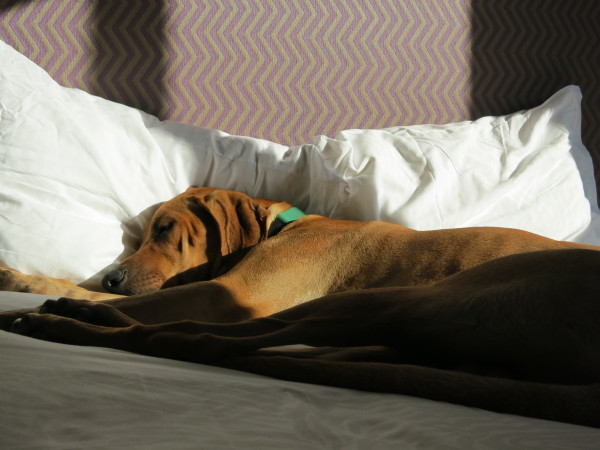It’s 4am. You hear shuffling around the bedroom. A soft yap is just loud enough to stir you out of slumber. If you ignore these signals they will only become louder. If your dog’s tall enough (or your bed’s low enough) you’ll feel the mattress dip as your beloved pooch leaps on top of you. After a relentless amount of circling to find the perfect spot, you soon find a hairy elbow shoved in your face (and it’s not your partner). No matter how much you push against the paws kicking you, you’re clinging onto the edge of the mattress. So you give in and let your pup sleep on the bed. Sound familiar?
Research commissioned by DogBuddy shows that twenty five percent of UK dog owners allow their dogs on the bed. If we know we’re in for a bad night’s sleep with a dog outside the bedroom (and possibly a worse one with pooch on the bed with us), why do we bother? Aside from that, is it teaching our dogs bad habits?
Should You Share Your Bed With Your Dog?
Is it healthy?
Obviously, if you suffer from allergies you shouldn’t be sleeping with your pooch. Ideally, no animals should be allowed in your bedroom if this is the case. If you do allow your dog in, you should use a HEPA filter to purify your air as much as possible.
Be wary if your dog likes to eat animal faeces or if he is particularly dirty. Allowing dirty and sick dogs on your bed will increase the risk of transferring diseases such as heartworm and lyme disease through parasites, fleas and ticks.
How much sleep will you get?
A study conducted by the Mayo Clinic Sleep Disorders Centre found that fifty three percent of their patients had a dog or cat, and as a result, half suffer from bad sleep.
Some people find that listening to the rhythmic breathing from their four legged friend soothes and calms them, or owners with large dogs feel safer and more secure with them near.
What to do if your dog sleeps in your room
Make sure you completely dog-proof your room. All cables should be out of reach so no little gnashers can chew on them. Tidy all small objects away and it’s probably best to put any handbags, clothes and shoes out of reach too!
What do the experts say about it?
The consensus amongst experts is that, in addition to the potential spreading of ticks and diseases, other downsides if you share your bed can include possible bad behaviour, difficulties in toilet training and the development of aggressive behaviour. The odd snuggle with your pooch on a weekend morning is all very well, however, on a regular basis your pooch is best in their own bed – not yours.
Does your dog share your bed? Has this affected their behaviour? Share your experiences in the comments below.

